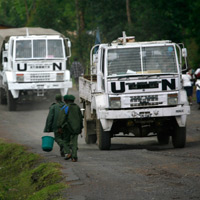

Bukavu, South Kivu — The commanders of the Kimia II offensive here in South Kivu are quick to provide detailed figures on the number of rebels from the Democratic Forces for the Liberation of Rwanda, or FDLR, they have killed or caused to surrender to back up their positive assessment of the military operation. But these numbers provide little comfort to communities paying the price for the poorly organized operations. In addition to the horrific direct effects of reprisal attacks by the FDLR, whose leadership helped orchestrate the Rwandan genocide, and Congolese army predation, a rising tide of indirect insecurity is contributing to an atmosphere of terror.
- Pay soldiers regular, adequate salaries and curbing corruption within the ranks, including senior officials complicit in the illegal mining and trade of minerals.
- Prevent Congolese soldiers from taking their dependents with them during military operations. This will begin to remedy some of the incentives for looting and predation.
- Promote accommodation between fragmented forces within the Congolese army and improve coordination between the armed forces and provincial political authorities.
- Accelerate stabilization by prioritizing the deployment of police and administrative structures in South Kivu.

